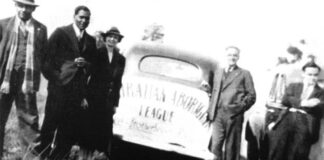A growing number of NT Aboriginal communities are pushing to reclaim control of their communities and assets, in the wake of the Country Liberals’ NT election victory promising to restore community control.
The “Stronger Futures” legislation passed through Federal parliament in June continued key Intervention measures such as discriminatory alcohol and porn bans, extreme police powers and compulsory income management.
But the government was not confident about any further compulsory acquisition of Aboriginal land. Instead they have attempted to blackmail communities into signing “voluntary” leases over housing and administrative buildings in exchange for ongoing maintenance and service funding.
The Northern Land Council, eager to secure this revenue stream and keep the government onside, have secured hundreds of leases across the Top End.
But some communities, particularly in central Australia, are using the reacquired property rights in their townships to try and reclaim everything that’s been lost. They want mega-Shire councils which took over community offices and robbed their assets in 2008 kicked out, along with “Government Business Managers” (GBMs) installed under the Intervention. They want Aboriginal Community Government Councils reinstated, properly resourced and in control of municipal services and housing.
In August, traditional owners at Amoonguna sent a letter to the MacDonnell Shire requesting that they vacate the community. They have also requested that NT Housing cease collecting rent from local tenants. On September 5, they held their first meeting again as a Community Council, electing a new board and asserting their intention to resume management of community affairs.
Ampilatwatja has also refused a lease over their housing stock and the GBM’s compound. The lease “deal” included only a one-off payment for housing renovations and no building of new houses.
Ampilatwatja refused the paltry $1600 per annum rent offered for the GBM to stay in his compound and requested he leave immediately. They are also pushing for their community controlled corporation to take over delivery of municipal services.
On September 17, representatives from the communities of Kalkaringi, Daguragu and Lajamanu followed suit, issuing a declaration:
“We will not be signing any more leases—this is Aboriginal land that we fought hard for and we must be in control… The Shire and Intervention have until the end of November to get out of our communities or we will be taking action ourselves to have them removed”.
Cracks in the Intervention
The new Country Liberal NT government owe their election win to Aboriginal voters in the bush. Their platform of restoring community control and ending government neglect of small communities and outstations in favour of larger “hub towns” is a clear break with the bi-partisan consensus in support of the NT Intervention.
New Regional Development Minister Alison Anderson has talked about reviving a jobs scheme modelled on the old Community Development Employment Projects (CDEP).
Newly elected member for Arafura Francis Xavier Maralampuwi has criticised the imposition of alcohol bans, saying “we want the same rights as other Australians”. Chief Minister Terry Mills backed his call to lift the blanket bans. Even stridently pro-Intervention MLA Bess Price recently endorsed the “case-by-base” Cape York brand of income management, still unacceptably punitive, but far softer than the blanket application in the NT.
These cracks in the policy consensus reflect the crisis in Intervention policies on the ground, where the social problems and anger at the government are only growing.
A report from the NT Co-ordinator General of Remote Indigenous Services Olga Havnen released on September 24 contains a meticulous discrediting of government spending priorities since 2007, showing the criminal waste on bureaucracy and punitive programs.
$225 million has been spent on GBMs. Income management is costing more that $5000 per person per year. Yet most remote communities have no preschool and an estimated $2 billion on top of the current budget is required just to ensure basics like water, sanitation and power.
But in a worrying signal about their commitment to any genuine reform, the CLP government sacked Havnen just two weeks later. Their old, racist colours are on display in the town centres, where they plan to round up alcoholics and put them in prison camps.
Truly getting rid of the “hub towns” model requires confronting the Federal government, whose funding agreements with the NT restrict serious investment to so called “economically viable” communities.
The CLP is now talking of “regional councils” taking over from the Shires. But restoring even the asset base that existed prior to 2007 would require large amounts of compensation. The CLP government will have to be fought in order to win this. For the first time since 2007, we can see serious cracks in the Intervention monolith. A campaign of solidarity with community resistance at Amoonguna and elsewhere is needed to break it wide open.
By Paddy Gibson





